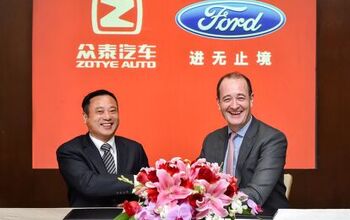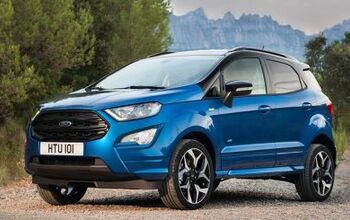Ford-Mahindra Joint Venture Is a Go

Eager to avoid further losses in the growth-primed Indian market, Ford has sealed a deal with an automaker that knows its way around the subcontinent: Mahindra & Mahindra.
Originally a partner when Ford cast its line back into India in the 1990s, the two automakers drifted apart, only to grow chummier when Ford’s global streamlining efforts took root. An alliance sprung up in 2017. Now, Mahindra will hold a controlling stake in the new JV, with Ford owning a 49-percent share of the business (while retaining full ownership of the Ford brand). Boosted market share and joint vehicle development tops the Blue Oval’s hopes, and you can bet that new SUVs are on the way.
Three SUVs, to be exact, including a new midsize model that’s all Mahindra underneath.
When word of the impending joint venture leaked out, sources claimed Ford execs were dismayed after $2 billion in investment in that market failed to pan out, leaving the company with a market share of roughly 3 percent. Hardly a great position to be in in the world’s second-most populous country — a country where non-domestic brands like Hyundai are eating its lunch.
Volkswagen, which succeeded in making huge inroads in the Chinese market, also has its eye on an Indian conquest.
Like all JVs, this $275 million tie-up aims at being mutually beneficial. For Ford, it means greater market penetration and reduced costs. For Mahindra, it sets the stage for greater success outside India. Both companies will continue selling their products strictly through their own dealer networks.
“Driving greater economies of scale across the automotive value chain including sourcing, product development and access to relevant technologies, the joint venture is expected to achieve enhanced efficiencies to strengthen the Ford brand in India,” the automakers stated in a joint announcement. “In addition, the joint venture will be a catalyst for growth for the Ford and Mahindra brands in emerging markets, which are growing at double the rate of the global industry.”
They added, “The joint venture will use the Ford brand distribution network in emerging markets to extend support for export of Mahindra products, in addition to Ford branded vehicles. Exports today form about 7 percent of Mahindra’s auto business revenues and its products are exported to South Africa, Nepal, Bangladesh, Sri Lanka and Chile, among other nations and areas.”
While Ford’s India business, including its Chennai and Sanand assembly plants, will fall under the Mahindra-controlled joint venture by the middle of next year, the automaker will continue to own 100 percent of its Sanand engine plant, as well as Ford Credit, its business services unit, and Ford Smart Mobility.
[Image: Ford India]

More by Steph Willems
Latest Car Reviews
Read moreLatest Product Reviews
Read moreRecent Comments
- BrandX "I can charge using the 240V outlets, sure, but it’s slow."No it's not. That's what all home chargers use - 240V.
- Jalop1991 does the odometer represent itself in an analog fashion? Will the numbers roll slowly and stop wherever, or do they just blink to the next number like any old boring modern car?
- MaintenanceCosts E34 535i may be, for my money, the most desirable BMW ever built. (It's either it or the E34 M5.) Skeptical of these mods but they might be worth undoing.
- Arthur Dailey What a load of cow patties from fat cat politicians, swilling at the trough of their rich backers. Business is all for `free markets` when it benefits them. But are very quick to hold their hands out for government tax credits, tax breaks or government contracts. And business executives are unwilling to limit their power over their workers. Business executives are trained to `divide and conquer` by pitting workers against each other for raises or promotions. As for the fat cat politicians what about legislating a living wage, so workers don't have to worry about holding down multiple jobs or begging for raises? And what about actually criminally charging those who hire people who are not legally illegible to work? Remember that it is business interests who regularly lobby for greater immigration. If you are a good and fair employer, your workers will never feel the need to speak to a union. And if you are not a good employer, then hopefully 'you get the union that you deserve'.
- 28-Cars-Later Finally, something possibly maybe worth buying.
































Comments
Join the conversation
This tie-up could potentially result in the Best. Tractor. Ever. Think about it.
It's a match made in heaven. This is a joint venture in a country almost as big as China, but without the involuntary technology transfers. Ford better keep an eye on Mahindra though.